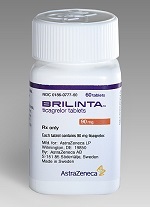Last month, AstraZeneca's ($AZN) big plans for Brilinta took a hit when a trial in stroke patients showed it was no better than aspirin at staving off a second stroke, heart attack or cardiovascular death. But Thursday brought better news for the U.K. drugmaker, which hopes to pump Brilinta up to $3.5 billion in peak sales.
 The American College of Cardiology and American Heart Association rolled out new treatment guidelines putting Brilinta in the top spot it for certain patients with acute coronary syndrome--those with coronary stents and those who suffered a particular type of heart attack known as STEMI.
The American College of Cardiology and American Heart Association rolled out new treatment guidelines putting Brilinta in the top spot it for certain patients with acute coronary syndrome--those with coronary stents and those who suffered a particular type of heart attack known as STEMI.
That makes AstraZeneca's brand preferred over clopidogrel, aka Plavix, which has long been the gold standard blood thinner. Now, clopidogrel is available as a cheap generic, and AstraZeneca can use the ACC/AHA backing to argue for its more expensive brand. Brilinta brought in $619 million in 2015 sales.
The new guidelines also recommend using Brilinta for longer than the previous standard of 12 months after a heart attack. It's the first time a U.S. medical group has changed its blood-thinner advice based on AstraZeneca's big, expensive PEGASUS-TIMI 54 trial.
AstraZeneca has been hoping for a guideline change--and the sales boost it could offer--since the FDA approved Brilinta for long-term use in patients with a history of heart attack. The approval by itself wasn't expected to do much for Brilinta sales, particularly with payers, given that clopidogrel generics are available. The guidelines update bolsters AstraZeneca's reimbursement argument.
"We are pleased that the ACC/AHA have further recognized the role of Brilinta across a broad spectrum of ACS," Elisabeth Björk, AstraZeneca VP of cardiovascular and metabolic drug development, said in a statement. "This update reflects the clinical confidence in Brilinta as a treatment option for heart attack patients in the acute setting and in the longer-term."
Pushing Brilinta in this patient population is particularly important now, after the drug fell short in the SOCRATES stroke trial. With pennies-per-tablet aspirin proving just as good as the $7-per-day (list price) Brilinta, payers have little impetus to fund the brand instead, analysts figure. Full data is expected from that trial later this year.
- read the AZ release
Special Reports: The top 15 pharma companies by 2014 revenue - AstraZeneca